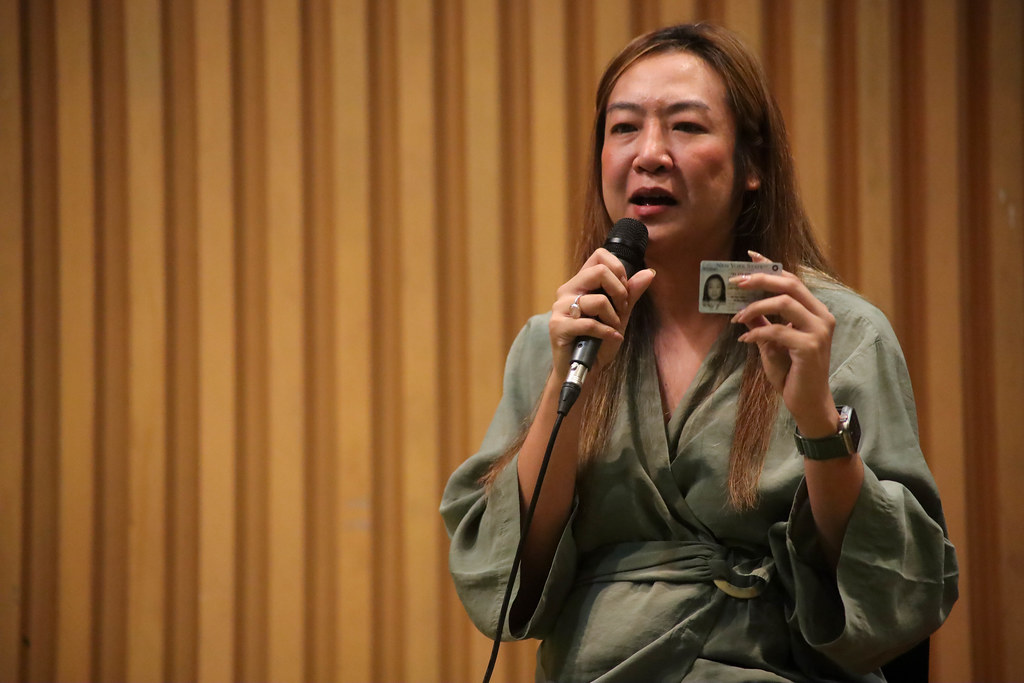A civil society network is preparing to propose a gender recognition bill which would allow trans people to change the gender markers in their official documents to match their identities. It would also permit non-binary people to use gender-neutral markers and allow intersex people to employ gender neutral markers until they decide their gender orientation.

Activists discussing the three bills launched at the 20 September press conference
Called the Recognition of Gender Identity, Gender Expression, and Sex Characteristics Bill, it would give people 15 years or older the right to change their gender markers without requiring medical transition, such as gender confirmation surgery, hormonal treatment, or any psychiatric treatment. Registrar officials would be prohibited from requesting medical certificates or documentation beyond whatever is stipulated by the bill and subsequent ministerial regulations.
It would also permit children younger than 15 to change their gender markers with the consent of their parents or legal guardian. In cases where consent is not granted, children would have the right to request that a public prosecutor file a request for a court order allowing them to change their gender markers.
The bill proposes that non-binary or intersex people be allowed to used the gender-neutral marker Other/X and not be required to place a gendered title before their name. It would also prohibit sex selective surgery for intersex children who do not grant their consent. A surgery could only be performed when a child undergoing the procedure consents through a legal representative. Violation of this provision would result in assault charges being filed under the Criminal Code.
Until they are able to choose their own gender, intersex children would also be allowed to use the gender marker Other/X on legal documents and birth certificates to indicate that they are intersex. They would be able to change their gender marker to match their identity after they turn 15. This could be done earlier with the consent of their legal representative or a court order.
The bill would not only guarantee people the right to use gender markers and titles that match their respective identities, it would also protect their access to healthcare and their right to register marriages and adoptions. Changing a gender marker would not affect a person’s existing marital, parenting and adoptive parent status. People would also given the right to take leave from work to undergo medical transition and other labour rights law protections.
The campaign was launched at a press conference on 20 September as part of a campaign to propose three gender justice laws - the so-called “Three Miracle Laws” - by activists and civil society groups.
Two other bills were also launched during the same press conference: a bill proposing amendments to the sections on marriage and family in the Civil and Commercial Code to allow marriage registration regardless of gender and a bill repealing the 1996 Prevention and Suppression of Prostitution Act, which will legalise sex work and grant sex workers protection under labour laws. Each of the three bills requires a minimum 10,000 signatures from eligible voters in order to be introduced to parliament.

Nachale Boonyapisomparn
Trans right activist Nachale Boonyapisomparn, vice president of the Foundation of Transgender Alliance for Human Rights (ThaiTGA), said during the press conference that the aim of the bill is to assure that every person has the right to determine their own gender. The bill is also meant to be inclusive and protect every identity, including non-binary and intersex people.
According to the International Lesbian, Gay, Bisexual, Trans and Intersex Association (ILGA World), 24 UN member states have gender recognition laws based on self-identification, 18 require surgery or sterilisation, and 23 require a medical diagnosis. Only 19 have gender recognition laws allowing the use of non-binary gender markers.
Nachale said that, in societies where people are taught that there are only two genders, campaigns for gender recognition often face many questions, including whether changing gender markers would allow cisgender men to avoid military conscription or help criminals to escape justice. She pointed out that the bill was not about ‘special’ treatment but rather about protecting the rights of over 300,000 trans people living in Thailand. Noting that her gender classification on her American identification documents is already female, she believes that changing gender markers should be easy, and that an underlying gender bias is the only reason why Thailand does not have a legal gender recognition law. Once the three bills passed, she hopes that Thai society will become more equal.
“No matter who you are or what gender you are, you have a life with choices,” she said. “Every human being wants to have a choice. For trans people, we may not have a choice right now, because we don’t have the choice of declaring the gender we identify with. What we are trying to do is to give a person more choices so they can be happier with that choice. It’s a very simple explanation, but because of the biased perception that there are only two genders, most people in the society still don’t see it.”
Nachale does not think the X/Other gender marker would make a person a target of persecution; instead, it would give members of a marginalised group that already faces discrimination increased visibility and give society a chance to learn.
Another gender recognition bill, proposed by MPs from the Move Forward Party, is now up for public consultation. Called the Gender Recognition, Gender Titles, and Protection of Gender Diversity Bill, it would allow trans and non-binary people to change gender markers on their official documents, provided that they are Thai citizens who have not been charged with or convicted of sexual crimes or human trafficking and are not listed in an international crime database on sexual offences or human trafficking. If the person requesting gender recognition is under 18 years of age, they would need to submit a certificate from a psychiatrist and or obtain parental consent.
Under this bill, trans people would be able to change their gender marker to match their identity, while non-binary people would be free to use the marker “Gender Diverse.”
The bill would also protect the rights of trans and non-binary people to healthcare, labour protection, abortion, and the use of public space as the gender they are recognised as. It would require the Department of Corrections to detain a trans person who has undergone gender confirmation surgery at a facility that match their respective gender identity Trans people who have not undergone surgery would be detained at facilities in accordance with the gender they were assigned at birth. Non-binary people would also be detained at at facilities in accordance with their birth genders but would be segregated to assure their safety .
The bill would prohibit doctors from performing sex selective surgery on intersex babies. Parents would also be prohibited from authorising such surgeries, unless they had been advised by a doctor that the procedure was needed to save the child’s life. Birth certificates of intersex children would not list their gender. Instead, they would have the right to choose a gender marker when they turn 7, or 15 if they had not done so earlier. They would also be able to request a court order to change to their gender marker after they had already chosen one.
The bill lists penalties for filing false documents and issuing false certificates, as well as for changing gender markers to avoid military conscription, or receive benefits under women’s rights or gender equality promotion schemes.
Prachatai English is an independent, non-profit news outlet committed to covering underreported issues in Thailand, especially about democratization and human rights, despite pressure from the authorities. Your support will ensure that we stay a professional media source and be able to meet the challenges and deliver in-depth reporting.
• Simple steps to support Prachatai English
1. Bank transfer to account “โครงการหนังสือพิมพ์อินเทอร์เน็ต ประชาไท” or “Prachatai Online Newspaper” 091-0-21689-4, Krungthai Bank
2. Or, Transfer money via Paypal, to e-mail address: [email protected], please leave a comment on the transaction as “For Prachatai English”
